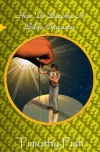
And Thy House
Extra Feature: High Res Image

History of
Cane Creek
Association
by D. F. Magruder
Aiming for Good Writing
Written By: Timothy Fish Published: 12/13/2007
Writing is subjective. At least, that is my personal opinion. Let me repeat that. Writing is subjective. There are a couple of ways to look at this. An author might choose to look at criticism and ignore it because it is only an opinion. An author might also look at this and become concerned because the opinions of others makes the difference between a novel that sells well and one that languishes in obscurity. Whether and author writes to make money or writers for the benefit of others, the success of the author is often determined by book sales and book sales is influenced by the opinions of others.
If writing were objective in nature, authors could feed their manuscripts into a computer and the computer would tell them how great or how poor their work was. It would count the number of words. It would count the number of times the plot shifted. It would count the number of characters and subplots. Then by some formula, it would assign a number to it and people would know just how good it was.
Some people have tried to make the claim that if the Bible were the inspired word of God then it would be a much better work of literature than what it is. Now, many of us like the Bible just fine, but it will do little good to be drawn into this argument because writing is subjective. To say that the Bible is not what it says it is because we donít like how it is written is foolish, to say the least, but it does go to show that it is hard to please everyone with out writing. Even God didnít try to please everyone.
We want to write good stories, but what is it that defines a good story? Chip MacGregor once described stories we should aim for as ďstories that are entertaining, that engage the emotions, that cause us to reflect, or that demand attention.Ē (http://chipmacgregor.typepad.com/main/2007/12/interviews-plat.html#comment-92800888) He was referring to stories that an author might tell during an interview, but I believe this can apply in any format. It is very similar to Chris Kingís recommendations, which are that a good story will touch people, has substance, has conflict and resolution, creates vivid images, is not wimpy, is perfect for the audience and is something the storyteller loves to tell. (http://www.creativekeys.net/StorytellingPower/article1004.html). Another person tells us that literature gives order to the human experience, explore cultural values and demands an emotional response. It also shows the reader things that he has not seen before (http://www.learner.org/interactives/literature/). The opinions of all three of these people are similar, but different. Steve Laube seemed to have a more subjective view when he said, ďI can know if it doesn't work on the first page or two. To know if it really works I'll find myself many pages into the material before I realize how much I've read.Ē (http://www.stevelaube.com/interview.htm)
There are similarities in what all four of these people have said, but because writing is so subjective, what one of these people like the others may hate. The agents in the bunch probably have a good idea of what they can sell to a publisher, but even among the experts, there really are no experts. Experience just makes them better guessers than the rest of us. Letís look at some of the things the people mentioned above think make a good story.
A Story the Author Likes
Many people donít know this about me, but I am an award winning author. When I was in the seventh grade, I received a trophy for a short story that I wrote. While I hope that my writing has improved since then, I learned a lot that year about writing stories that I love and knowing when my own writing is good. Earlier that year I wrote a short story that I was certain would impress everyone, but it didnít. Then I wrote the one for which I received the award. In writing the first one, I remember writing about the main character. I told what he did. I told about the house he lived in. I told about many different things. The difference between that story and the award-winning story was that in the later story I found myself slipping into the story. I donít remember what the story was about now, but I remember wanting to be in the middle of it. I donít think there was a word that I wrote that did anything other than what I imagined myself doing in that imaginary world.
I believe that the authorís experience and the readerís experience will be very similar. The author should first love the story so much that he wants to take part in it. He should imagine himself living through the situation. When he can do this, his goal should be to tell the reader what it is like to be in this fascinating place. The reader wants to experience this also. When the author enjoys the story, her greatest problem is painting a picture with words so that the reader than experience what she is experiencing.
An Emotional Story
Every good story involves emotion. Some people have the idea that a story that engages the emotions is one that is a tearjerker. Emotions are much more complex than that, so an emotionally engaging story is much more complex as well. There are several emotions including anger, fear, sadness, happiness, disgust, curiosity, surprise and acceptance. It can add depth to a story when a character experiences these things, but what we want to happen is for the reader to experience these things or some of them. Sadness is the emotion that readers feel when a story brings the reader to tears. Something happens, such as a childís mother dying and the reader feels sorrow.
A reader may feel anger when a character harms a favored character. Fear comes when the reader believes a character is in danger. Happiness comes when then are looking up for the character. Disgust causes a person to dislike a character. Curiosity or interest causes a reader to want to know more, to keep turning pages. Surprise comes when something happens that the reader is not expecting. Acceptance comes when the reader concludes that things must be the way they are.
When trying to write so that the reader feels these emotions, the author must write in such a way the he feels these emotions. If a character makes him angry then it may make the reader angry. If the author feels fear, then it may make the reader feel fear. If the author finds himself reading more quickly to get from one page to the next then it is very likely that the reader will be doing the same.
The Rules and Mechanics
People like to talk about plot, theme, structure, characters, setting, style and tone. They also say a lot about grammar and the mechanics of writing. Even with the so called rules there is a lot of subjectivity in writing. People tell authors to show rather than tell. It is often good advice, but there are times when telling something in simple terms works much better than providing the detail required to show the reader what is happening. One person will say to avoid revealing thing too quickly while another will say to reveal things quickly so that the reader understands what is happening.
Many of the rules of writing are more along the lines of rule of thumb. Many of these rules hold true for good writing, but following the rules blindly without knowing the final goal will not produce good writing.
The Final Goal
If an author knows what good writing looks like then it is much more likely that he will be able to produce good writing, but writing is subjective. An author might choose to compare his work to that of an author he likes, but his reasons for liking the author may be different than the reasons other people like the author. Even after incorporating elements in his own work that he thinks have improved his work, an author may find that agents and publishers do not agree.
Feedback from others may help an author reevaluate what he considers to be good work. Experience that comes from rejection or dismal sales may cause an author to rethink some things, but in the end the only thing an author has to aim for is his own concept of what is good. The author must aim for a story that he enjoys. An author must aim for a story that pulls at his own emotions. An author must aim for a story that pulls him in and hope that it does the same for his readers.
www.timothyfish.com



